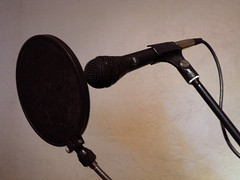B. Thomas Cooper
Editor
When it comes to recording vocals, misconceptions abound. So many talented singers, so little dependable information. We are all instantly capable of recognizing a strong vocal performance, but what goes into capturing that performance usually isn't so obvious.

It all starts with a good singer and a good song. From there, choose a reliable microphone. Many engineers prefer using large diaphragm condenser microphones, but I have no preference. After thirty years of intensive studio experience I have learned to rely on the vocalist, not the microphone. While working as a staff producer at the world famous Power Station Studios, I had at my disposal nearly every quality microphone imaginable. One quickly learns not every vocal should be captured with an expensive condenser or ribbon mic. Think hard about what it is you're trying to accomplish. Feel free to experiment.
Remember, good microphone technique and proper singing habits will profoundly effect your vocal performance. A microphone can only capture what you produce. Once the performance has been captured, it can be enhanced through various means, including reverb, compression, etc. but all the reverb in the world will not drown out a bad performance.
Singers tend to be a finicky lot, a fact I can personally attest to. Still, no two vocalists are alike. Do whatever it takes to make the singer comfortable and confident. A good headphone mix is crucial. If you can't hear what your doing, you stand little chance of doing it well. I can honestly say the Power Station had the best headphone systems I have ever experienced. It is little wonder to me why the studio produced so many hit records.
From here, things get somewhat slippery. A producer like Terry Date will not approach a vocal for the Deftones in the same manner Jim Steinman might approach a Meat Loaf recording. Even at the highest levels of the industry, approach can be radically different.

Depending on the vocalist, an engineer may determine it necessary to use a ‘pop screen’ or ‘wind screen’. The purpose of this device is to soften the ‘sibilance’ or hissing noises associated with singing. It might also prevent you from spitting into an expensive microphone. The distance one should sing from the microphone depends on a number of variables. Again, think it through, and don’t be afraid to experiment.
Unless all indications suggest to the contrary, go with the flow. In other words, don't rock the boat. Become a part of the process. Learn all you can about recording, and keep an open mind. A strong vocal track can make or break an otherwise average recording. It is our goal to recognize the difference.








